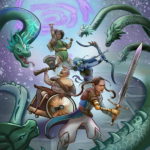Glossary

Because this book is not a medical book, we do not adhere to strict medical definitions and labels. Most specific terms are explained in their individual entries, but since we use some similar terms throughout, here’s some clarification. This book also uses fifth edition game terms as defined in official sources and assumes familiarity with or access to the Basic Rules.
Condition: When accompanied by one of the fourteen temporary states of existence in official fifth edition rules (e.g., the blinded condition), it refers to that official game mechanic. Otherwise, the word is used according to its standard definition.
Complication: When capitalized, this refers to a condition that results from a trait or event and is usually temporary.
Disability: Used according to its standard definition, this term implies limitation of movements, senses, or activities. We primarily use this term when referring to real-world experiences.
Disorder: We only use this term for examples and discussions of real-world medical conditions.
Experience: We use this word according to its standard definition, referring to living through one or more events. Note that we only use “lived experience” to refer to real-world experiences, since playing a character with that experience is only a temporary simulation of the experience.
Frequency: When capitalized, this refers to how often and for how long a trait expresses itself in-game. Each trait has an assigned Frequency, and the trait’s description refers to the character’s experience when the trait is active.
Impact Extent (IE): This game term, further described below with a range of 1–4, refers to the relative degree to which a trait expresses itself in a character’s life.
Trait: This term refers to a creature’s symptom, experience, or condition as expressed in game terms. Every trait has a Frequency and IE unless noted in the description. Unless specifically noted in the description or decided by the players, all traits are permanent and incurable.